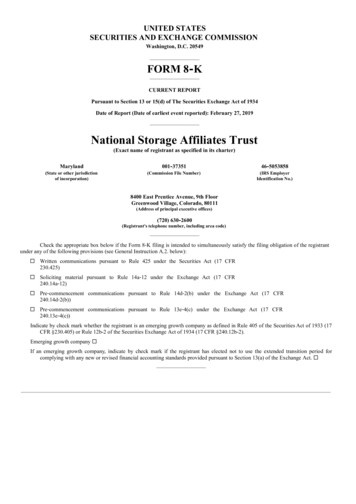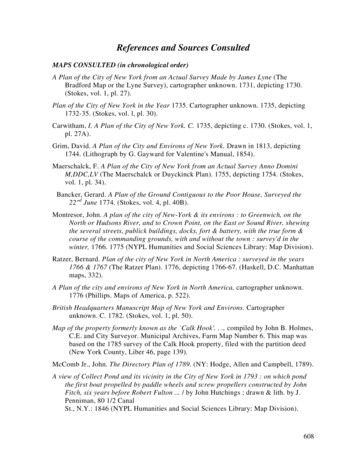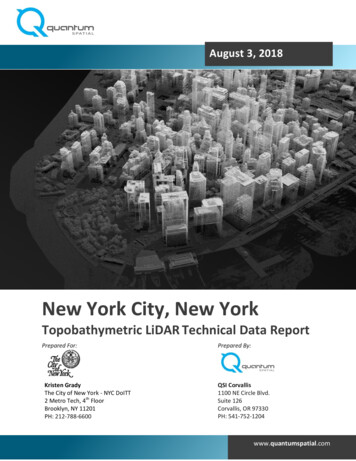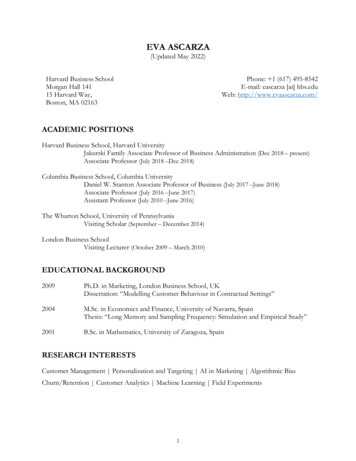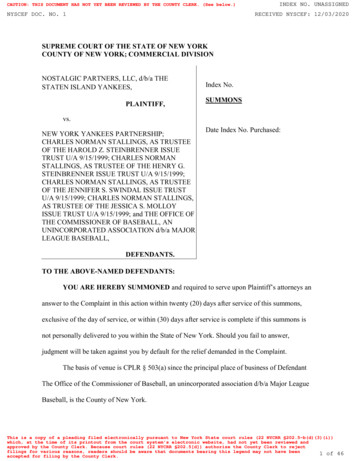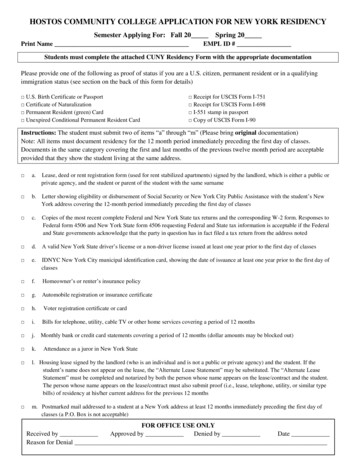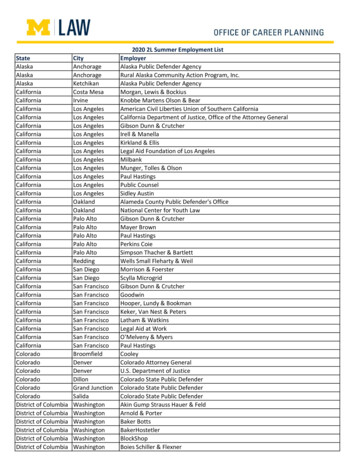
Transcription
SPRING 2018NEW YORK UNIVERSITYSCHOOL OF LAW“Tax Competition and Global Background Justice"Peter DietschUniversity of Montreal Philosophy DepartmentJanuary 23, 2018Vanderbilt Hall – 208Time: 4:00 – 5:50 p.m.Week 2
SCHEDULE FOR 2018 NYU TAX POLICY COLLOQUIUM(All sessions meet from 4:00-5:50 pm in Vanderbilt 208, NYU Law School)1. Tuesday, January 16 – Greg Leiserson.Washington Center for Equitable Growth. “Removingthe Free Lunch from Dynamic Scores: Reconciling the Scoring Perspective with the Optimal TaxPerspective.”2. Tuesday, January 23 – Peter Dietsch, University of Montreal Philosophy Department. “TaxCompetition and Global Background Justice.”3. Tuesday, January 30 – Andrew Hayashi, University of Virginia Law School. “CountercyclicalTax Bases.”4. Tuesday, February 6 – Gerald Auten, U.S. Treasury Department. “Income Inequality in theUnited States: Using Tax Data to Measure Long-Term Trends.”5. Tuesday, February 13 – Vanessa Williamson, Brookings Institution.6. Tuesday, February 27 – Jacob Goldin, Stanford Law School.7. Tuesday, March 6 – Lisa Phillips, Osgoode Hall Law School. “Gendering the Analysis of TaxExpenditures.”8. Tuesday, March 20 – Michelle Hanlon, MIT Sloan School of Management.9. Tuesday, March 27 – Damon Jones, University of Chicago Harris School of Public Policy.10. Tuesday, April 3 – Ajay Mehrotra, American Bar Foundation and Northwestern UniversitySchool of Law. “T.S. Adams and the Beginning of the Value-Added Tax.”11. Tuesday, April 10 – Jason Furman, Harvard Kennedy School.12. Tuesday, April 17 – Emily Satterthwaite, University of Toronto Law School. “Electing into aValue-Added Tax: Survey Evidence from Ontario Micro-Entrepreneurs.”13. Tuesday, April 24 – Wolfgang Schon, Max Planck Institute. “Taxation and Democracy.”14. Tuesday, May 1 – Mitchell Kane, NYU Law School.
The Journal of Political Philosophy: Volume 22, Number 2, 2014, pp. 150–177Tax Competition and Global Background Justice*Peter DietschPhilosophy, Université de MontréalandThomas RixenPolitical Science, Social Science Research Center Berlin (WZB)AGLOBALIZED economy raises intricate questions of distributive justice.Some of these have come under scrutiny in the literature. Under whatconditions can international trade be regarded as respecting norms of fairness?Are wages at the subsistence level a necessary step on the path to growth or aform of exploitation? Who does and who should benefit from the profitsgenerated by the exploitation of natural resources? Yet, one importantdeterminant of global justice, namely questions of international taxation, hasreceived little attention in the philosophical debate.1 While the importance oftaxation as a means of implementing domestic public policy and conceptions ofjustice is widely acknowledged—and indeed often taken for granted—issues*Versions of this article have been presented at the Canadian Political Science Association(Montréal, 2010), the ECPR General Conference (Reykjavik, 2011), the Social Science ResearchCenter Berlin (WZB) as well as at the Centre de Recherche en Éthique de l’Université de Montréal(CREUM). For comments on previous drafts of this article we thank participants at these events and,in particular, Kim Brooks, Ryoa Chung, Matthias Ecker-Ehrhardt, Tim Gemkow, Anja Görnitz,Monika Heupel, Dominic Martin, Mihaela Mihai, Jean-Pierre Vidal, Lora Viola, Daniel Weinstock,David Wiens, Jurgen de Wispelaere, and Michael Zürn. Special thanks are due to Barbara Buckinx,Miriam Ronzoni, and Christian Schemmel for detailed written comments and to Georg Simmerl forhis research assistance. We acknowledge financial support from the Humboldt Foundation, theGerman Academic Exchange Service (DAAD), and the Social Sciences and Humanities ResearchCouncil of Canada (SSHRC).1Notable exceptions are Gillian Brock, “Taxation and global justice: closing the gap betweentheory and practice,” Journal of Social Philosophy, 39 (2008), 161–84; Alexander W. Cappelen, “Themoral rationale for international fiscal law,” Ethics & International Affairs, 15 (2001), 97–110 andMiriam Ronzoni, “The global order: a case of background injustice? A practice-dependent account,”Philosophy & Public Affairs, 37 (2009), 229–56. Brock discusses challenges of international taxationsimilar to the ones at the heart of this article, yet her account of potential solutions differs from oursin that she focuses on various kinds of global taxation rather than principles to make nationaltaxation more effective. Cappelen analyses the current distribution of international rights to taxthrough the lens of theories of distributive justice. Ronzoni, whose work we shall discuss in moredetail later, identifies tax competition as an instance of background injustice.More common are contributions from lawyers and economists discussing normative principles ofinternational taxation. See e.g. Richard A. Musgrave and Peggy B. Musgrave, “Inter-nation equity,”Modern Fiscal Issues, ed. R. M. Bird and J. G. Head (Toronto: University of Toronto Press, 1972),pp. 63–85; Reuven S. Avi-Yonah, International Tax as International Law (New York: CambridgeUniversity Press, 2006). 2012 John Wiley & Sons Ltddoi: 10.1111/j.1467-9760.2012.00419.x
TAX COMPETITION & GLOBAL BACKGROUND JUSTICE151of international tax justice are mostly neglected. Tax competition between statesputs pressure on domestic fiscal regimes. Mobile factors of production havethe opportunity to “shop around” to minimize their tax burden. Thisinterdependence of national tax regimes generates external effects that underminethe de facto sovereignty of states. As a consequence, tax competition tends toexacerbate inequalities of income and wealth both within countries and acrossborders.One way to address these issues is to condemn the distributive outcomes and topropose redistributive policies to correct what are perceived to be unjustinequalities. This approach is largely remedial. A second possibility is to examinethe rules of the game of international taxation themselves, and to make sure theydo not contain any unjust bias. This approach, which is geared towards theprevention of injustice in the first place, is the approach favored here. To whatextent does the fiscal interdependence between countries call for a normativeinterdependence in the form of obligations towards other countries thatgovernments have to respect in designing their fiscal policy? How can we delineatelegitimate fiscal interdependence from illegitimate tax competition? These arethe questions addressed in this article. They target the conditions of globalbackground justice that need to be met to guarantee rules of international taxationthat are free from unjust bias.2 The reference point for a just international orderis one where states have effective sovereignty over their fiscal affairs. Selfdetermination of this kind serves as the normative premise of our argument. Itprovides the foundation for advocating functionally differentiated supranationalinstitutions but, importantly, delineates our approach from calls for a wholesaletransfer of fiscal sovereignty to a supranational or even world government.The article is structured as follows. In a first step, we sketch the impact of threedifferent kinds of tax competition—for portfolio capital, so-called paper profits,and foreign direct investment (FDI)—on the de facto sovereignty of states. Weshow how tax competition exacerbates social inequalities in order to explain whyit is a case of background injustice and should thus be on the radar of theories ofjustice (Section I).The central part of the article then lays out two principles of internationaltaxation designed to both protect and circumscribe the fiscal prerogatives of thestate. First, a membership principle which holds that deriving the benefits ofmembership in any given country grounds an obligation to pay one’s taxes there.This principle substantially curtails competition for portfolio investment andpaper profits. Second, a constraint on fiscal policy that rules out fiscalarrangements which can be shown both to be based on strategic intent—luring inforeign capital—and to have a collectively negative outcome—reducing theaggregate extent of fiscal self-determination. This constraint serves as a tool to2IV.See Ronzoni, “The global order.” The idea of background justice is discussed in detail in Section
152PETER DIETSCH AND THOMAS RIXENassess the legitimacy of fiscal measures to attract FDI. Taken together, themembership principle and the fiscal policy constraint allow us, we argue, todelineate legitimate fiscal interdependence from illegitimate tax competition(Section II).In Section III, we address the question of how these principles could beimplemented. We propose the establishment of an International TaxOrganization (ITO) after the model of the World Trade Organization (WTO) andendorse unitary taxation with formulary apportionment (UT FA) as a reform ofcorporate taxation. We also evaluate the political feasibility of our proposal.In Section IV, we discuss the objection that our principles are incompatiblewith defending a cosmopolitan theory of global justice. Furthermore, weelaborate on the normative status of our account as one of global backgroundjustice. Section V concludes.I. HOW TAX COMPETITION UNDERMINESFISCAL SELF-DETERMINATIONIn this section we show that tax competition leads to policy changes that are notlegitimately chosen by the states involved, but forced upon them by competitivepressures.3 In other words, tax competition undermines the self-determination ofstates. We first explain what fiscal self-determination entails and then how taxcompetition undermines it.A. THE CONTENT OF FISCAL SELF-DETERMINATIONIn order to establish the fiscal prerogatives of the state, it is useful to step back andconsider what the purpose of taxation is. At the most basic level, it is needed inorder to finance public goods.4 Due to collective action problems their provisiongenerally requires a central enforcement institution, the state. Therefore the priorpublic good paid for by taxes is the state itself. The state can be viewed as acomplex exchange between individuals, performed in order to supply themselveswith the public goods necessary to pursue their individual life plans. Under apluralism of conceptions of the good life, the legitimacy of the state is generallygrounded in a democratic form of government, where those subject to thecoercively enforced rules of the state are also the authors of these rules.Importantly, for the purposes of the present section, we take it for grantedthat polities should be granted considerable autonomy in designing their state3As is generally the case with competition, the pressure it exerts is not external to competitors’individual acts, but is in fact constituted by them. Nevertheless, competition presents a structuralconstraint on each individual actor, as it could only be eliminated or mitigated collectively. In thatsense policy reactions by individual states are ‘forced upon’ them by competition.4The category of public goods is broadly construed here. It includes not only public infrastructurebut also less tangible goods like the maintenance of a legal order or the redistribution of income andwealth.
TAX COMPETITION & GLOBAL BACKGROUND JUSTICE153institutions. In the fiscal context, a stylized definition of collective selfdetermination entails two basic choices. These choices respectively concern thesize of the public budget (level of revenues and expenditures) and the question ofrelative benefits and burdens (extent of redistribution). Importantly, these choicesof policy objectives extend to the means selected to realize them, like for instancethe calibration of the tax mix between direct and indirect taxes. While there arecertainly many different views on how these two evidently interdependentchoices ought to be made, there is widespread agreement that they constitute thefiscal prerogatives of the state.5 This is the substantive content of fiscalself-determination or tax sovereignty.6Three points are worth mentioning. First, we make the simplifying assumptionthat governments perfectly track their citizens’ preferences.7 We acknowledgethat this is an unrealistic assumption, since government actions often are theresult of rather messy and contentious political processes, in which differentgroups of citizens pursue different interests. It is, in reality, not necessarily truethat differences in political preferences within the polity of a state are lessimportant than differences between polities. Second, a distinction needs to bemade between de jure and de facto tax sovereignty. As will become clear in thenext subsection, effective self-determination in fiscal matters requires the latter.Third, self-determination is not to be understood in absolute terms. Instead,effective protection from illegitimate interference by other states requires limitson self-determination. Spelling out these limits lies at the heart of this article.B. THE CONSEQUENCES OF TAX COMPETITIONTax competition is defined as interactive tax setting by independent governmentsin a non-cooperative, strategic way. For tax competition to exist there must befiscal interdependence. This condition is met if tax bases are sensitive tointernational tax differentials. Tax base mobility must be legally possible and itmust actually occur.8 Favorable tax conditions to attract foreign capital can bebrought about in various ways, such as a reduction in tax burdens (be it byreducing tax rates or defining tax bases in favorable ways), fashioningpreferential tax regimes for foreigners, or creating (or not closing) tax loopholes,for example through implementing bank secrecy rules or a lax enforcement ofexisting rules.5Reuven S. Avi-Yonah, “Globalization, tax competition, and the fiscal crisis of the welfare state,”Harvard Law Review, 113 (2000), 1573–676; James M. Buchanan and Richard A. Musgrave, PublicFinance and Public Choice (Cambridge: MIT Press, 1999), pp. 29–103.6We discuss the normative foundations of the (fiscal) self-determination of states in Section IV.7For a discussion of the problems associated with this assumption see Alexander Cappelen,“Responsibility and international distributive justice,” Real World Justice, ed. A. Follesdal andT. Pogge (Dordrecht: Springer, 2005), pp. 215–28 at pp. 220–22.8John D. Wilson and David E. Wildasin, “Capital tax competition: bane or boon,” Journal ofPublic Economics, 88 (2004), 1065–91 at pp. 1065–6.
154PETER DIETSCH AND THOMAS RIXENTax competition primarily targets capital, which is mobile internationally.9Governments use different strategies and tax instruments depending on the kindof capital targeted. Three kinds of capital can be distinguished. First, in the areaof portfolio capital of individuals and firms, so-called “tax havens” often havelow or zero tax rates. More importantly, they offer strict bank secrecy rules aswell as certain legal constructs such as trusts that enable individuals to hide theirownership vis-à-vis tax administrations in their state of residence. The taxpayer’sbehavior in these cases constitutes illegal tax evasion. Due to its illegality it ishard to come up with reliable figures, yet the available evidence suggests thatthese policies have a real impact. Estimates of the worldwide yearly revenuelosses to government coffers range from USD155–255 billion.10Second, governments compete for so-called paper profits. Through varioustechniques, such as manipulating transfer prices (especially of intangible assets)and thin capitalization, multinational enterprises (MNEs) can assign profits madein high-tax countries to their subsidiaries in low-tax countries without relocatingreal business activity. Such “tax planning” activity of MNEs is not necessarilyillegal; it constitutes (legal) tax avoidance.11 Despite different approaches, allempirical investigations into this issue come to the same conclusion: the transferof taxable profits is very sensitive to taxation, and companies make ample use ofthese possibilities. The decisive factor in attracting mobile profits is the nominaltax rate, because companies shift only those profits that cannot be offset againstdepreciation and other tax benefits.12 Again, governments may also decide tocompete via specially designed regimes to attract paper profits. For example, theregime of Special Financial Institutions (SFI) in the Netherlands allows foreigncompanies to channel capital through them in order to realize tax benefits.Third, there is competition for FDI in the form of real business activity, forexample the location decisions of MNEs. These business decisions depend on9States may, in theory, also compete to attract mobile individuals via taxes on labor income.Empirically, while there is some competition for individuals in very high income brackets, labor taxcompetition is insignificant. Cf. Peter Schwarz, “Does capital mobility reduce the corporate-labor taxratio?” Public Choice, 130 (2007), 363–80. We bracket labor tax competition in this article.10Jeffrey Owens, “Written testimony of Jeffrey Owens, Director, OECD Center for Tax Policy andAdministration before Senate Finance Committee on Offshore Tax Evasion, 3 May 2007” jo1.pdf ; Tax Justice Network (TJN), “Tax us ifyou can: the true story of a global failure,” Tax Justice Network Briefing Paper (London: Tax JusticeNetwork International Secretariat, 2005).11Former British chancellor Denis Healey famously said that the difference between avoidance andevasion is the “thickness of a prison wall.” For a description of these and other techniques of shiftingpaper profits, see e.g. Brian J. Arnold and Michael J. McIntyre, International Tax Primer (Den Haag:Kluwer Law International, 1995), pp. 8–17. The fact that 60% of world trade is intra-firm indicatesthat the tax base at stake is significant.12Ruud A. de Mooij and Sjef Ederveen, “Corporate tax elasticities: a reader’s guide to empiricalfindings,” Oxford Review of Economic Policy, 24 (2008), 680–697; Michael P. Devereux, “Theimpact of taxation on the location of capital, firms and profit: a survey of empirical evidence (withData Appendix by Giorgia Maffini),” Working Paper (Warwick: University of Warwick, 2006). Thefact that profit shifting is possible may explain the weaker effect of tax policies on FDI. As long asMNEs can realize tax savings without business relocations, the competition for FDI and paper profitsis in a substitutive relationship. We return to this issue in Section II.
TAX COMPETITION & GLOBAL BACKGROUND JUSTICE155various factors such as countries’ respective levels of education, costs of labor,and quality of infrastructure. But the effective tax burden also plays a role.Empirical studies come to the conclusion that raising taxes decreases the inflowof FDI. However, the direction and strength of the correlation is strongly affectedby the method of measurement and the kinds of tax rates investigated.13 In theirquest to attract FDI, governments may either lower the general business tax rateor engage in designing so-called preferential tax regimes, which grant taxadvantages to foreigners only (ring fencing).Standard economic theory predicts a “race to the bottom” in capital taxationand the under-provision of public goods in all jurisdictions.14 While this extremeoutcome cannot be observed empirically, it can be shown that tax competitionundermines the fiscal self-determination of states, that is, their ability toeffectively set the size of the budget and the extent of redistribution. In OECDcountries, nominal corporate tax rates have fallen from an average of 50% in1975 to an average of 25.7% in 2010. Over the same period, nominal toppersonal income tax rates have fallen from 70% to 41.4%. These rate cuts wererefinanced by broadening the bases on which taxes are applied (“tax cut cum basebroadening”). As a result, corporate tax revenue as a percentage of GDPremained stable at an average of about 2.5%, whereas income tax revenue evenrose from 11.2% to 12.8% of GDP.15 The trend towards low nominal tax ratesand broad tax bases is an attempt to defend against the outflow of mobile profitsand at the same time prevent an adverse revenue effect.16While revenue losses did not occur, the “tax cut cum base broadening” policyaffects the distribution of the tax burden among different kinds of taxpayers. Forone, there is an effect within the business sector: highly profitable MNEs benefit,while nationally organized small and medium-sized enterprises are more heavilyburdened. Second, the tax burden is shifted from capital to labor. This is alsovisible in the general trend to increase indirect taxes, such as consumption taxes.Last but not least, competitive downward pressure on corporate tax rates affectsthe distributional characteristics of the personal income tax. If the nominalcorporation tax rate is lowered, then it is worthwhile for private individuals tore-label their income by incorporating. In order to prevent such arbitrage, policymakers often align the corporate tax rate and the top rate on personal income,thus flattening the personal income tax schedule.1713De Mooij and Ederveen, “Corporate tax elasticities.”See e.g. Wilson and Wildasin, “Capital tax competition,” pp. 1069–70.15OECD Centre for Tax Policy and Administration, “OECD tax data base” www.oecd.org/ctp/taxdatabase ; Steffen Ganghof, The Politics of Income Taxation (Colchester: ECPR Press,2006), p. 1.16See e.g. Andreas Haufler and Guttorm Schjelderup, “Corporate tax systems and cross countryprofit shifting,” Oxford Economic Papers, 52 (2000), 306–25.17Simon Loretz, “Corporate taxation in the OECD in a wider context,” Oxford Review ofEconomic Policy, 24 (2008), 639–660; Steffen Ganghof and Philipp Genschel, “Taxation anddemocracy in the EU,” Journal of European Public Policy, 15 (2008), 58–77.14
156PETER DIETSCH AND THOMAS RIXENFor developing countries, the dynamics of a race-to-the-bottom have a morevisible impact. The pressure from tax competition on public finances iscomparable to OECD countries, but developing countries usually do not have theadministrative resources to stabilize their revenues by broadening tax bases. Onthe contrary, in many countries the base has been narrowed.18 A significant partof the revenue loss is directly due to the shifting of paper profits. One studyestimates the annual revenue loss of developing countries from transfer pricing tobe USD160 billion.19Overall, the empirical evidence shows that tax competition undermines fiscalself-determination.20 While states still possess the formal right to set tax policies(de jure sovereignty), they cannot effectively pursue their desired policy goals (defacto sovereignty). Developed countries are able to maintain the size of thebudget (the first component of self-determination), but this can only be achievedby compromising the desired extent of redistribution (the second component ofself-determination). By contrast, developing countries are not able to preventrevenue losses and thus lose out on both components of fiscal self-determination.In this respect, tax competition increases existing inequalities between countriesof the global North and South. For these reasons, we consider international taxcompetition in its present form to be a case of background injustice. In theabsence of an institutional framework to regulate it, it introduces multiple kindsof bias into the international fiscal regime that lack justification.II. TWO PRINCIPLES OF GLOBAL BACKGROUND TAX JUSTICE:MEMBERSHIP AND FISCAL POLICY CONSTRAINTThe last section specified the content of fiscal self-determination anddemonstrated how it is endangered by tax competition. Just like in the case ofindividual liberty, to be effective the liberty to make these collective choices isrestricted by the same liberty for the citizens of other countries. The twoprinciples we will advance in this section spell out these restrictions and aremeant to ensure that countries have an effective right to tax that reflects their18Michael Keen and Alejandro Simone, “Is tax competition harming developing countries morethan developed?” Tax Notes International, 34 (2004), 1317–25.19Christian Aid, “Death and taxes: The true toll of tax dodging” (London: Christian Aid, 2008).20Some observers argue that the policy choices described above—tax cuts cum base broadening,increasing reliance on indirect taxes, and low tax burdens on capital—are not caused by taxcompetition. They argue that these policies reflect a general shift towards market-conformingtaxation that governments have implemented irrespective of competitive pressures. Cf. e.g. SvenSteinmo, “The evolution of policy ideas: tax policy in the 20th century,” British Journal of Politicsand International Relations, 5 (2003), 206–36. While it is true that there are also domestic efficiencyreasons for implementing these policies, our foregoing sketch of the mechanisms shows—in line withmost of the public finance literature—that these changes are to a significant extent driven by thepressures of tax competition. For more on this debate, see Thomas Rixen, “Taxation andcooperation: international action against harmful tax competition,” Globalization. State of the Artand Perspectives, ed. S. A. Schirm (London: Routledge, 2007), pp. 61–80. However, as we will discussin Section II, if such policies were indeed chosen for domestic reasons only, they would not indicatea violation of self-determination but an instance of it.
TAX COMPETITION & GLOBAL BACKGROUND JUSTICE157polities’ choices about the size of the state budget and the desired extent ofredistribution. The membership principle is based on the intuition that capitalmobility renders this liberty fragile and that it therefore needs to be protected.The fiscal policy constraint argues that this liberty can be abused and thereforecalls for it to be circumscribed.A. THE FIRST PRINCIPLE: MEMBERSHIPImagine you live on a street with two health clubs. One high-end club withexpensive equipment and all kinds of freebies like club towels and shavingequipment, and one less fancy club that lacks the rowing machines, has only threestep masters instead of ten and no freebies. Unsurprisingly, the membership fee ofthe high-end club is almost three times that of its no-frills competitor. You are amember of the no-frills club. One day, you discover that your membership cardactually lets you pass the turnstile at the high-end club, too. You keep quiet andstart working out there. As it turns out, quite a few members of the no-frills clubfrequent the fancy club. A month later, you bump into a friend in the washroomsof the high-end club. “What are you doing here?” he asks. With a sheepish lookon your face, you tell him about your discovery. He is enraged. “You guys arefree-riding on our membership fees.” He informs the manager and, the next day,the high-end club starts issuing new membership cards. This reaction appearsjustified.For the purposes of our argument, the analogy between countries and healthclubs is a useful one. There are places, such as the Scandinavian countries, thatprovide more services like state-financed daycare, more generous unemploymentinsurance, and so on, but in turn also “charge” more in terms of taxes.21 Thereare others, like England, where citizens prefer to have a leaner set of services andhence pay less. Certain forms of tax planning that involve shifting one’s tax baseto a low-tax jurisdiction without moving the underlying activity itself are parallelto using the high-end health club on your no-frills card. When a company usesthe services of a country—that is, its infrastructure, human capital, and so on—toproduce a certain commodity, but then shifts the paper profit made with thiseconomic activity to low-tax jurisdictions through practices like transfer pricingor thin capitalization, the citizens who finance these services have a legitimatecomplaint. Tax evasion on portfolio capital, as suggested by its illegality,represents an even blunter form of abuse and can be likened to jumping theturnstile at the high-end health club when no one is watching.We are now in a position to formulate our first principle of internationaltaxation, the membership principle:21We put “charge” in inverted commas here, because we do not mean to imply adherence to thebenefit principle. See also discussion below.
158PETER DIETSCH AND THOMAS RIXENNatural and legal persons should be liable to pay tax in the state of which they area member.In order to apply the principle, it is necessary to define membership. Ourdefinition is the following: individuals and companies should be viewed asmembers in those countries where they benefit from the public services andinfrastructure.22 This conception of membership is related to, but distinct from,what is called the “benefit principle” or the principle of “fiscal equivalence” inthe public finance literature.23 The benefit principle is usually contrasted with theability to pay principle.24 Whereas the latter justifies redistribution, the formerdoes not and makes taxes strictly proportional to the individual benefitstaxpayers receive in return. Our conception of membership is more general andcomprises both of these principles. It is compatible with what has been called“group fiscal equivalence,”25 which demands that the collective benefits of thegroup of citizens should be proportional to the amount of taxes paid. It thusallows for redistribution among individuals and corporations. As implicit in ournotion of fiscal self-determination, the citizens of a state may (or may not) decidethat it is appropriate to tax higher incomes at higher rates.26 On this issue, theabove analogy between the health clubs and countries breaks down. True to itsobjective to re-establish the de facto sovereignty of states, the membershipprinciple is silent on the actual tax system chosen by poli
5. Tuesday, February 13 - Vanessa Williamson, Brookings Institution. 6. Tuesday, February 27 - Jacob Goldin, Stanford Law School. 7. Tuesday, March 6 - Lisa Phillips, Osgoode Hall Law School. "Gendering the Analysis of Tax Expenditures." 8. Tuesday, March 20 - Michelle Hanlon, MIT Sloan School of Management. 9.



